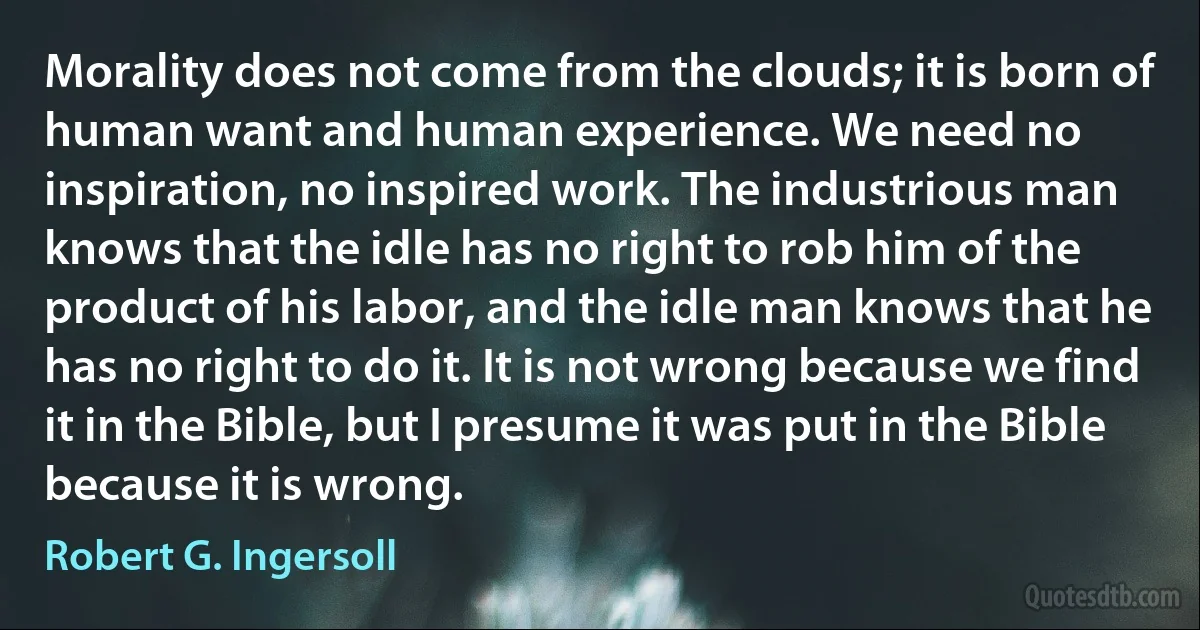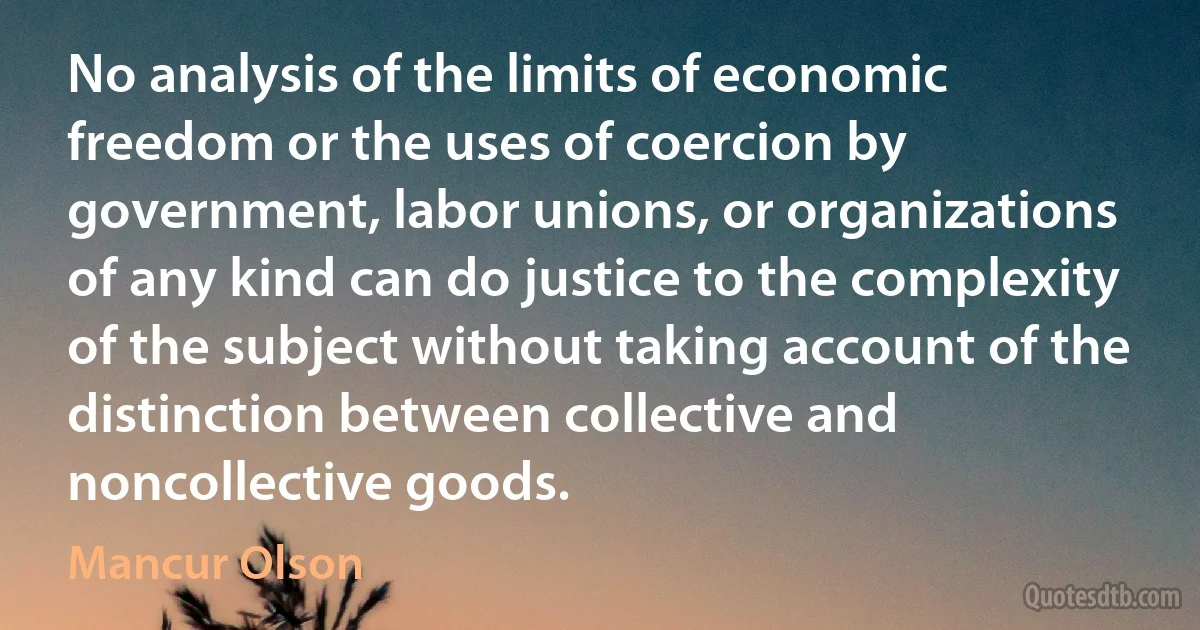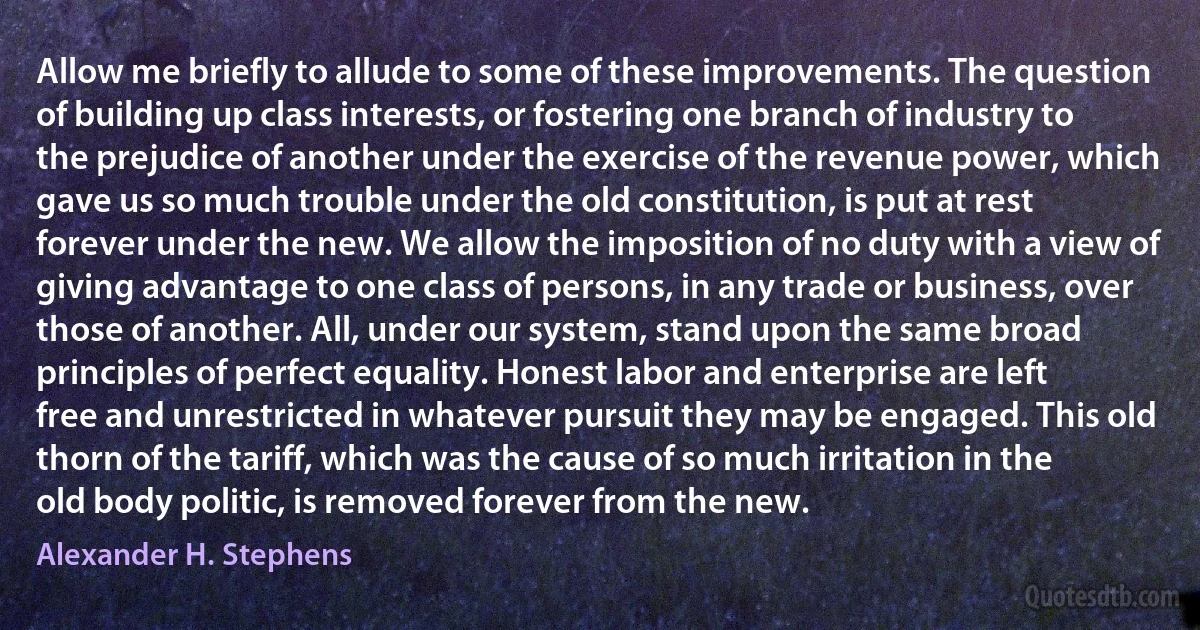Labor Quotes - page 24
For hundreds of years it was contended by all Christians that the earth was made in six days, literal days of twenty-four hours each, and that on the seventh day the Lord rested from his labor. Geologists have driven the church from this position, and it is now claimed that the days mentioned in the Bible are periods of time. This is a simple evasion, not in any way supported by the Scriptures. The Bible distinctly and clearly says that the world was created in six days. There is not within its lids a clearer statement.

Robert G. Ingersoll
The view has been gaining widespread acceptance that corporate officials and labor leaders have a "social responsibility"... beyond serving the interests of their stockholders or their members. This view shows a fundamental misconception of the character of a free economy. In such an economy there is one and only one social responsibility of business-to use its resources and engage in activities designed to increase its profits so long as it stays within the rules of the game, which is to say, engages in open and free competition without deception fraud. Similarly, the "social responsibility" of labor leaders is to serve the interests of the members of their unions. It is the responsibility of the rest of us to establish a framework of law such that an individual... is, to quote Adam Smith... "led by an invisible hand... I have never known much good done by those who affected to trade for the public good."

Milton Friedman
Human labor, through all its forms, from the sharpening of a stake to the construction of a city or an epic, is one immense illustration of the perfect compensation of the universe. The absolute balance of Give and Take, the doctrine that every thing has its price, - and if that price is not paid, not that thing but something else is obtained, and that it is impossible to get any thing without its price, - is not less sublime in the columns of a leger than in the budgets of states, in the laws of light and darkness, in all the action and reaction of nature. I cannot doubt that the high laws which each man sees implicated in those processes with which he is conversant, the stern ethics which sparkle on his chisel-edge, which are measured out by his plumb and foot-rule, which stand as manifest in the footing of the shop-bill as in the history of a state, - do recommend to him his trade, and though seldom named, exalt his business to his imagination.

Ralph Waldo Emerson
Centuries of their labor would not reveal to them any more of Creation than they already knew. Yet through their endeavor, men would glimpse the unimaginable artistry of Yahweh's work, in seeing how ingeniously the world had been constructed. By this construction, Yahweh's work was indicated, and Yahweh's work was concealed.

Ted Chiang
[A world-system is] a system that is a world and which can be, most often has been, located in an area less than the entire globe. World-systems analysis argues that the units of social reality within which we operate, whose rules constrain us, are for the most part such world-systems (other than the now extinct, small mini-systems that once existed on the earth). World-system analysis argues that there have been thus far only two varieties of world-systems: world-economies and world empires. A world-empire (examples, the Roman Empire, Han China) are large bureaucratic structures with a single political center and an axial division of labor, but multiple cultures. A world-economy is a large axial division of labor with multiple political centers and multiple cultures.

Immanuel Wallerstein
But there was sufficient spirit of toleration and candor amongst the Italian ecclesiastics to allow the subject to be canvassed with much freedom They entered warmly themselves into the controversy often favoring different sides of the question and however much we may deplore the loss of time and labor devoted to the defense of untenable positions it must be conceded that they displayed far less polemic bitterness than certain writers who followed them beyond the Alps two centuries and a half later.

Charles Lyell
The Soviet leaders accused Comrade Stalin of allegedly interfering in other parties, of imposing the views of the Bolshevik Party upon others. We can bear witness to the fact that at no time did comrade Stalin do such a thing towards us, towards the Albanian people and the Party of Labor of Albania, he always behaved as a great Marxist, as an outstanding internationalist, as a comrade, brother and sincere friend of the Albanian people. In 1945, when our people were threatened with starvation, comrade Stalin ordered the ships loaded with grain destined for the Soviet people, who also were in dire need of food at that time, and sent the grain at once to the Albanian people. Whereas, the present Soviet leaders permit themselves these ugly deeds.

Enver Hoxha
A man who is without capital, and who, by prohibitions upon banking, is practically forbidden to hire any, is in a condition elevated but one degree above that of a chattel slave. He may live; but he can live only as the servant of others; compelled to perform such labor, and to perform it at such prices, as they may see fit to dictate.

Lysander Spooner
Historically, labor unions arose when people had gotten a taste of a different lifestyle and were willing to pay a lot more for their basic livelihood and had gotten into a fix they couldn't get out of – because they had accepted the unacceptable to begin with. Accepting something you have to form a labor union to fight after the fact only tells me that people were acting against their own best (or even good) interests for a long time. I don't see any rational, coherent explanation for this sort of behavior in humans, but it's all over the place.

Erik Naggum
Old people at the supermarket make you wonder about all those middle-aged people you see jogging the streets to preserve their vascular systems for another fifty years.
And about all the people of all ages all over the country who are eating less, drinking less, smoking less, driving safer and in general looking for a death-proof safety suit to get them over the peak years and down into the valley of old age fit to enjoy the fruits of their abstention and labor.
Will anybody care when they get there?
Will they be able to afford an orange?

Russell Baker
We watched some of the movie. It was shocking. Sex is apparently hard labor. Various persons supported crushing weights in agonizing positions for what seemed like endless blocks of time. Exhausted men grunted and toiled like movers trying to get a refrigerator into a fifth floor walk-up.

Russell Baker
Early in life, most of us probably observe an unhappy relationship between labor and wealth - to wit, the heavier the labor, the less the wealth.
The man doing heavy manual work makes less than the man who makes a machine work for him, and this man makes less than the man sitting at a desk. The really rich people, the kind who go around on yachts and collect old books and new wives, do no labor at all.
The economic reasons for dividing the money this way are clear enough. One, it has always been done that way; and two, it's too hard to change at this late date. But the puzzling question is why, since the money is parceled out on this principle, young people are constantly being pummeled to take up a life of labor.
In any sensible world, the young would be told they could labor if they wanted to, but warned that if they did so it would cost them.

Russell Baker



